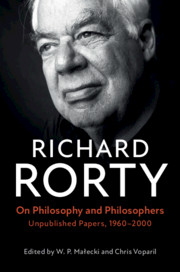Book contents
- On Philosophy and Philosophers
- On Philosophy and Philosophers
- Copyright page
- Contents
- Acknowledgments
- Note on Sources
- Introduction: Rorty as a Critical Philosopher
- I Early Papers
- II Later Papers
- 9 Philosophy as Epistemology: Reply to Hacking and Kim
- 10 Naturalized Epistemology and Norms: Replies to Goldman and Fodor
- 11 The Objectivity of Values
- 12 What Is Dead in Plato
- 13 The Current State of Philosophy in the United States
- 14 Brandom’s Conversationalism: Davidson and Making It Explicit
- 15 Bald Naturalism and McDowell’s Hylomorphism
- 16 Reductionist vs. Neo-Wittgensteinian Semantics
- 17 Remarks on Nishida and Nishitani
- Index of Names
10 - Naturalized Epistemology and Norms: Replies to Goldman and Fodor
from II - Later Papers
Published online by Cambridge University Press: 10 October 2020
- On Philosophy and Philosophers
- On Philosophy and Philosophers
- Copyright page
- Contents
- Acknowledgments
- Note on Sources
- Introduction: Rorty as a Critical Philosopher
- I Early Papers
- II Later Papers
- 9 Philosophy as Epistemology: Reply to Hacking and Kim
- 10 Naturalized Epistemology and Norms: Replies to Goldman and Fodor
- 11 The Objectivity of Values
- 12 What Is Dead in Plato
- 13 The Current State of Philosophy in the United States
- 14 Brandom’s Conversationalism: Davidson and Making It Explicit
- 15 Bald Naturalism and McDowell’s Hylomorphism
- 16 Reductionist vs. Neo-Wittgensteinian Semantics
- 17 Remarks on Nishida and Nishitani
- Index of Names
Summary
“Naturalized Epistemology and Norms: Replies to Goldman and Fodor” addresses the views of Alvin Goldman and Jerry Fodor and concerns the question of how much psychology can contribute to epistemology. The position Rorty adopts is that it contributes very little and that whatever it can is of not much use because epistemology is of not much use in the first place. The paper develops this point by drawing on Rorty’s views on mind and knowledge and applying them to Goldman’s distinction between three kinds of epistemology (descriptive, analytic, and normative) as well as to Fodor’s project of explaining the intentionality of mental states by referring to the semantic properties of mental representations. The paper concludes by situating its criticisms of Fodor and Goldman in the larger context of the conflict between realism and pragmatism in the philosophy of mind.
- Type
- Chapter
- Information
- On Philosophy and PhilosophersUnpublished Papers, 1960–2000, pp. 157 - 171Publisher: Cambridge University PressPrint publication year: 2020

